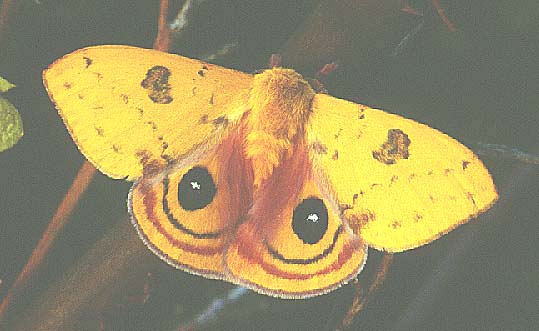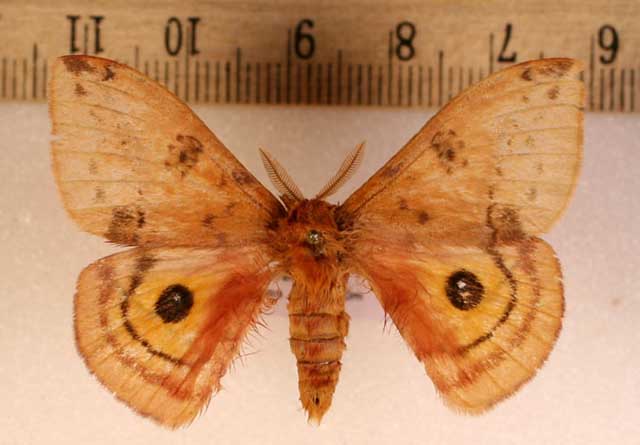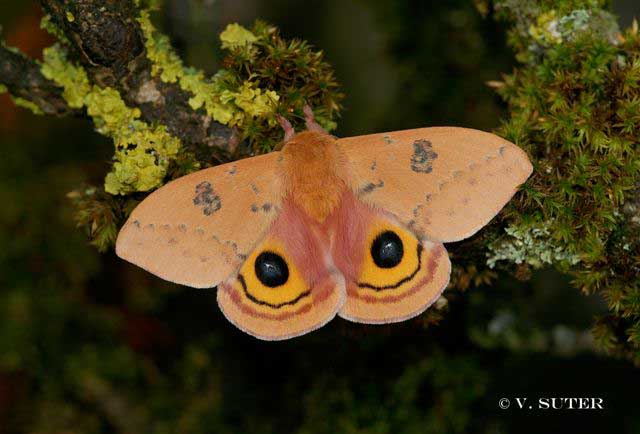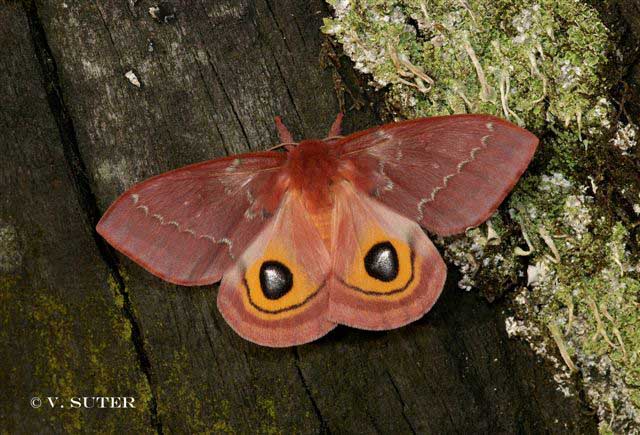Automeris colenon
Automeris colenon
Dyar, 1912

Automeris colenon moth photo courtesy of Chris Conlan.
This site has been created by
Bill Oehlke at oehlkew@islandtelecom.com
Comments, suggestions and/or additional information are welcomed by Bill.
| TAXONOMY:
Superfamily: Bombycoidea, Latreille, 1802
Family: Saturniidae, Boisduval, [1837] 1834
Subfamily: Hemileucinae, [1837] 1834
Genus: Automeris, Hubner, [1819]
Species: colenon, Dyar
| |
MIDI MUSIC
"What.A.Wonderful.World"
copyright C. Odenkirk
MIDI CITY
ON.OFF
<bgsound src="world.mid" LOOP=FOREVER>
|
DISTRIBUTION:
The Automeris colenon moth
flies in
western and central Mexico: Sonora,
Sinaloa (??), Nayarit, Jalisco, Colima (??),
Guerrero, Morelos, Distrito Federal, Oaxaca, Chiapas;
and favours grassy areas
throughout lower oak woodlands, at elevations from 1100-2030m.

Automeris colenon male, Guerrero, Mexico, wingspan 59.6mm,
June, 950m, courtesy of Kelly Price.
I have identified the above moth, primarily based on geography and
very small size. The hindwing eyespot is very small which Lemaire indicates
is typical of A. colenon. It could also be a very small
A. io draudtiana.

Automeris colenon male, Mexico,
courtesy of Viktor Suter.
In his written description of this species, Lemaire indicates that A. colenon is very similar to a small
Automeris io, but A. colenon lacks or has a greatly reduced brownish spot along the inner margin between the pm line and the submarginal band.
However, on plate 50, Figures 6 and 7, the two males depicted show this spot, but it is reduced as compared to that of typical A. io.
Lemaire indicates there are two different male colour morphs, a yellow morph as well as a rosy-beige or orange-tan morph. There is also a cell marking/spot in the male
ventral forewing.
FLIGHT TIMES AND PREFERRED FOOD PLANTS:
Moths are on the
wing from May until October.
Automeris colenon larvae
feed upon grasses
(Cynodon).

Automeris colenon female, Mexico,
courtesy of Viktor Suter.
ECLOSION, SCENTING AND MATING:
Automeris colenon males use highly developed antennae to
locate mates at night by tracking the airbourne pheromone plume.
EGGS, LARVAE, COCOONS, AND PUPAE:Automeris colenon larvae have urticating spines and feed gregariously.
Pupation is
in a cocoon spun up amongst ground litter and surrounding grasses. Sixth instar
Automeris colenon larva to
right courtesy of Kirby Wolfe, copyright protected. It is hoped
that this alphabetical listing followed by the common name of the foodplant will
prove useful. The list is not exhaustive. Experimenting with closely
related foodplants is worthwhile.
Cynodon.....
|
Bermuda grass
|
| 
|
Use your browser "Back" button to return to the previous page.
Return to Mexican/Central American Automeris Genus
Goto Central American Saturniidae Directory
Goto Main Saturniidae Index




